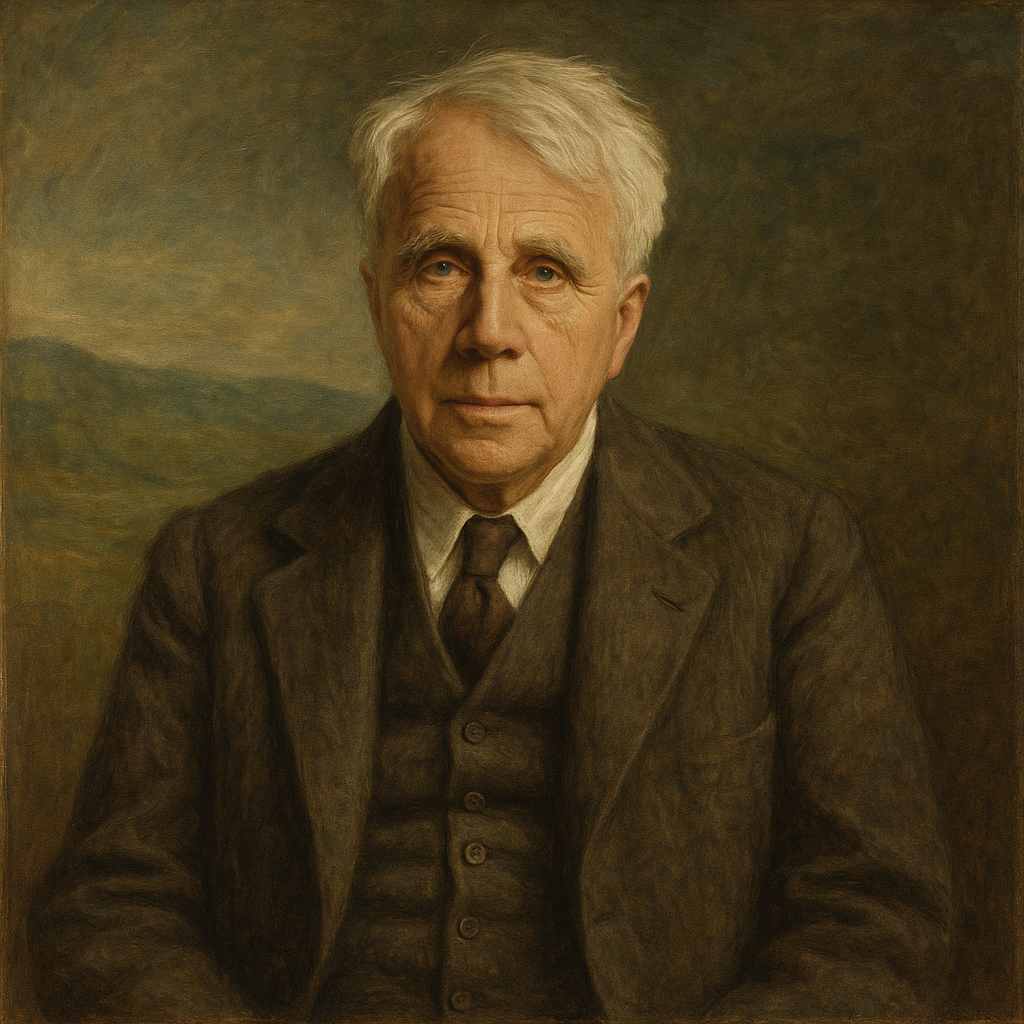The Road Not Taken
Robert Frost
1874 to 1963

Two roads diverged in a yellow wood,
And sorry I could not travel both
And be one traveler, long I stood
And looked down one as far as I could
To where it bent in the undergrowth;
Then took the other, as just as fair,
And having perhaps the better claim,
Because it was grassy and wanted wear;
Though as for that the passing there
Had worn them really about the same,
And both that morning equally lay
In leaves no step had trodden black.
Oh, I kept the first for another day!
Yet knowing how way leads on to way,
I doubted if I should ever come back.
I shall be telling this with a sigh
Somewhere ages and ages hence:
Two roads diverged in a wood, and I -
I took the one less traveled by,
And that has made all the difference.
Robert Frost's The Road Not Taken
Robert Frost's "The Road Not Taken" is a deceptively simple poem that has captivated readers for generations with its seemingly straightforward narrative of a traveler choosing between two paths in a forest. However, beneath this surface-level interpretation lies a complex meditation on decision-making, the nature of choice, and the human tendency to imbue our past actions with greater significance than they may have possessed at the moment.
The poem opens with the speaker confronting a fork in the road, a literal representation of a choice to be made. The setting of a "yellow wood" immediately evokes autumn, a season associated with change and transition. This autumnal imagery reinforces the theme of decision-making and sets a contemplative tone for the poem. The speaker's regret at not being able to "travel both" roads highlights a fundamental human limitation: we cannot experience all possible outcomes of our choices simultaneously.
Frost's use of the first-person perspective invites readers to identify with the speaker, making the poem's central dilemma feel personal and universal. The careful examination of the paths, looking down one "as far as I could / To where it bent in the undergrowth," illustrates the human desire to foresee the consequences of our choices before committing to them. However, the limited visibility due to the "undergrowth" suggests the inherent uncertainty in decision-making.
The second stanza introduces a subtle element of self-deception. The speaker claims to have taken the second path because it was "grassy and wanted wear," implying it was less traveled. Yet, in the very next lines, this assertion is contradicted: "Though as for that the passing there / Had worn them really about the same." This contradiction is crucial to understanding the poem's deeper meaning. It suggests that the differences we perceive in our choices may be less significant than we imagine, and that we often construct narratives around our decisions after the fact to justify them.
The third stanza further emphasizes the similarity of the two paths, noting that "both that morning equally lay / In leaves no step had trodden black." This image of untrodden leaves reinforces the idea that the choices before us are often more similar than different, and that the act of choosing itself may be more significant than the specific choice made. The speaker's declaration, "Oh, I kept the first for another day!" followed immediately by the admission, "Yet knowing how way leads on to way, / I doubted if I should ever come back," highlights the finality of our choices and the impossibility of exploring all potential paths in life.
The final stanza projects into the future, imagining the speaker retelling this story "ages and ages hence." The use of "ages" twice emphasizes the vast temporal distance between the moment of choice and the moment of reflection. The speaker predicts that they will recount this choice "with a sigh," suggesting a complex mixture of emotions - perhaps regret, nostalgia, or a sense of the profound impact of this seemingly small decision.
The poem's famous concluding lines, "I took the one less traveled by, / And that has made all the difference," are often interpreted as a celebration of individualism and nonconformity. However, in light of the earlier contradictions and the poem's overall tone, these lines can be read with a touch of irony. The speaker's claim that taking the less traveled road "has made all the difference" may be seen as a self-aggrandizing revision of a choice that was, in reality, between two very similar options.
Frost's masterful use of meter and rhyme scheme (iambic tetrameter and a rhyme scheme of ABAAB) gives the poem a musical quality that belies its complex themes. The regular rhythm and rhyme create a sense of inevitability, mirroring the way one decision leads inexorably to the next in life.
In conclusion, "The Road Not Taken" is a nuanced exploration of the human decision-making process and our tendency to mythologize our past choices. Frost challenges readers to consider the stories we tell ourselves about our lives and the ways in which we construct meaning from the paths we choose. The poem's enduring popularity may stem from its ability to resonate with the universal human experience of facing choices and grappling with their consequences, while simultaneously questioning the very nature of those choices and consequences. Through its deceptively simple narrative, Frost invites us to reflect on the complex interplay between choice, chance, and the narratives we construct about our lives.
This text was generated by AI and is for reference only. Learn more
Want to join the discussion? Reopen or create a unique username to comment. No personal details required!



Comments
No comments yet. Be the first to comment!